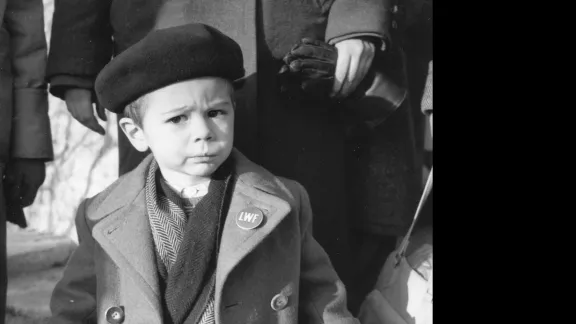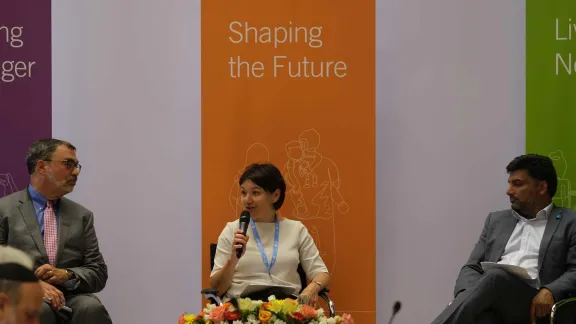Preserving and promoting the Lutheran communion’s institutional memory
The LWF Archives, housed at the LWF Communion Office in Geneva, preserve the records of the Lutheran World Convention, and the Lutheran World Federation. The collection contains paper documents, photographs, sound tapes, films and videos, and publications representing some 1,000 running meters, the institutional and historical memory of the Lutheran Communion. Their digitization process ensures long-term access, for future generations, to this unique and invaluable heritage consisting of milestone moments of the Lutheran World Federation.
"History is our future"
[ Aus Gegenwart wird Zunkunft ]

In the aftermath of the Second World War, the LWF supported thousands of displaced people in Europe. The young boy wearing an LWF pin on his coat lapel represents those pushed to leave their homes and find refuge elsewhere. Photo: LWF Archives
LWF Digital Archives, Library, and Museum
Note: Our inventories are currently migrated to a new system. Please use the LWF Archive Request Form or contact the archivist for more information at [email protected]
Stored on the Internet Archive platform, are a dozen of digitized collections of publications, including Assemblies, Ecumenism, Missions, Theology, Youth, Women, World Service, LWF regions, and Lutheran World.
Communion office Digital Photo Exhibition
Conditions of use
Researchers should read and follow the LWF Archives Rules and Fees; must complete, sign and send the LWF Archives Request Form, two weeks prior to a planned visit, to [email protected]:
- Consultation must follow the LWF Archives Rules and Fees and will only be approved upon request and appointment. It is free of charge.
- Access is granted to all files of LWF Archives after 20 years, calculated from the date on which the requested file is closed. In any particular case, the LWF may revoke open access to any document at any time when it asserts preponderant interests.
- Users must be accompanied by LWF at all times, in order to access the repositories, or be in possession of an explicit authorization.
- Personal devices, such as cameras or phones (without flash) are allowed but require previous authorization from the LWF staff.
- The LWF claims copyright on its archives. Copyright of archives of depositors or depositing organizations is governed by a specific agreement between the LWF and the depositor.
- Users citing or employing LWF archival sources must quote the source "Archives of the Lutheran World Federation" or "LWF Archives," and in case of use of an image, the quote should read "by permission of The Lutheran World Federation," and by indicating the exact archival reference number.

Opening of the conference with (from left) Mark Hetfield, President and CEO of HIAS, LWF General Secretary Anne Burghardt, and Waseem Ahmad, CEO of Islamic Relief Worldwide. Photo: LWF/M. Renaux
The LWF Archives collection predates the 1947 founding of the organization, and includes documents that are nearly 100 years old. Shortly after the LWF’s founding Assembly in Lund, Sweden in 1947, a Committee on History started exploring ways and means to establish permanent archives for the LWF. At the 1952 Assembly in Hanover, Germany, together with the other departments, an archive service was officially created. Finally in 1957, a German archivist was invited to Geneva to set up permanent archives. He introduced an archival system and organized the documents that had accumulated since 1945 when a representative of the Lutheran World Convention (LWC), the forerunner of the LWF, set an office in Geneva. Today most of the pictures and publications are digitalized and the 1 km archives boxes inventoried online, available on the LWF website
Consistent documentation of routine and milestone moments of an organization is critical for safeguard institutional memory. While the LWF itself was founded in 1947, LWF Archives hold material that is nearly 100 years old. They are located in the Ecumenical Center in Geneva
Officially established by the Second LWF Assembly in 1952, as were other LWF departments, they contain around 1 km of linear papers, laid end to end, and respond to requests from both within the organization and externally. They include records of LWF governing bodies, correspondence, LWF publications and reports, periodicals and newsletters, newspaper clippings, biography files, films, slides, photographs, videos and sound recordings, as well as a databank of resolutions by the governing bodies. The treasured collection covers the agendas and minutes from the Executive Committee of the LWF predecessor body, the Lutheran World Convention, 1923 - 1946.
Researchers and other individuals seeking information often request specific historical documents such as Assembly reports and speeches, people involved in the global Lutheran history, theological debates, correspondence, specific issues or themes, and photo, audio and video recordings.
The mandate of the service is to:
- maintain permanent archives documenting LWF activities, theological debate and developments in the Lutheran Communion;
- facilitate and stimulate research;
- assist staff and visiting researchers;
- collect material pertaining to Lutheranism worldwide;
- liaise with Lutheran archives and libraries;
- promote Lutheran heritage through exhibitions.
Related Content
History of the LWF
Contact
Get Involved
Share with us your stories, photographs and insights using the #LWF